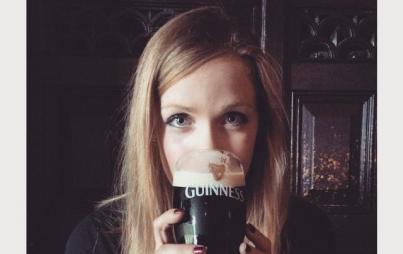
I learned to hide my lupus diagnosis as if it were a crime. (Photo by Jurica Koletić on Unsplash)
“Measure fifty!” the cellist beside me hissed. The notes in front of me wandered off the page to flit among the wedding guests sipping champagne. I had been playing wedding gigs since high school, but today, the music on the stand in front of me failed to penetrate the fog in my brain. Every few measures, misfiring synapses sent wrong notes out through my viola.
Exhaustion filled my head with cotton. My hands trembled. My bow skittered across the string.
I learned to hide my diagnosis as if it were a crime. I became skilled in the art of misdirection. Laughter could distract from the tremors in my hands. A pixie cut or bob disguised the missing clumps of hair that clogged the shower drain each week. With the right shoes and a crisp pencil skirt, no one could guess I was too sick to work full time.
During a short break after the ceremony, I left my viola with the violinist in the trio and locked myself in a restroom stall. After fifteen minutes, I wiped away the places where tears smudged my mascara. Then I returned to my seat to finish the gig.
As twittering guests flocked to the drink table, the violinist motioned for us to begin again. My viola weighed on my shoulder. I knew the fatigue would linger into tomorrow and the day after. Still, I sat and pretended to be fine. Despite the fatigue. Despite the confusion. Despite the damage that working past the point of exhaustion was doing to my body.
As bridesmaids in elegant dresses giggled and mingled, I wondered if my brain would ever be the same. I was afraid to know the answer.
I lost my mind for the first time when I was twenty-two. A month into my first semester of a Master’s degree in viola performance at the University of Hartford, a thick fog settled into my brain. Fingers that had once flown across the strings of my instrument stumbled. I forgot to return phone calls or turn in assignments. The textbooks, sheet music, and cardigan sweaters strewn across my apartment seemed to vanish when my back was turned. I left my viola bow in a practice room overnight. My bike disappeared somewhere between my first apartment and the one I moved to before my second year of study. When I reached into my dresser drawer for a sock one day, I discovered two hundred dollars cash — the silver lining of brain fog, I joked to my friends.
Physical symptoms soon followed. Nausea propelled me to the bathroom each morning. Chunks of my hair carpeted the floor. No matter how much I slept, exhaustion trailed me like a jealous boyfriend. I’d planned on spending grad school studying, practicing, and sharing Blue Moons with friends after concerts. Instead, my days were filled with mysterious symptoms, skeptical doctors, and a cognitive haze that transformed even simple tasks into advanced calculus.
It took seven doctors eleven months to piece together the clues my body left them. Years later, their faces would blur together as I blasted the car radio, trying to drown out my thoughts. The doctor who interrupted me to tell me I was depressed before I finished listing my symptoms. The doctor who over-enunciated and then slipped me the number for a psychologist. The young urgent care worker who asked me earnestly if I was sure I wasn’t pregnant. The white-haired doctor who declined to run too many tests because “they can be confusing.” Doctor after doctor saw my youthful skin but not the pain lurking beneath it, my brown eyes but not the panic rising in their depths. Depression, bipolar disorder, pregnancy, Lyme disease, thyroid disease. I collected false diagnoses the way some people collect stamps.
The seventh doctor finally thought to test for autoimmune disease. Positive markers littered my blood test. I had lupus. I was in the middle of a flare, a period of heightened disease activity.
“The immune system is like an army,” Doctor Number Seven explained, straightening her lab coat. Her glasses magnified her brown eyes. “Your army is confused. Rather than attacking the enemy, germs, your immune system is attacking your body itself. Lupus is a chronic illness. You’ll have it all your life. Most of my patients regularly experience joint pain and fatigue,” she added.
The paper on the exam table crinkled under me.
“Will I have a normal life?” I asked.
“Of course!” she laughed.
Years of exhaustion would chip away at this last reassurance. “A normal life” would become yet another misdiagnosis.
When you’re sick, time seems to stand still. In reality, the clock ticks on. After my diagnosis, I graduated with my Master’s. I moved back to my hometown to marry my boyfriend of seven years. Hoping to leave lupus behind, I leapt wholeheartedly into a career as a violin teacher.
But the reactions of the people around me to my illness festered like a wound that refused to heal.
“Everyone thinks you’re totally weird,” a violinist in my Master’s program had once whispered before a faculty recital. I swiveled in my plush auditorium seat to face him. The lights dimmed as the curtain swung open. Had I been healthy, I would have deflated his grin with a sharp retort. But my words remained mired in the fog in my head.
I learned to hide my diagnosis as if it were a crime. I became skilled in the art of misdirection. Laughter could distract from the tremors in my hands. A pixie cut or bob disguised the missing clumps of hair that clogged the shower drain each week. With the right shoes and a crisp pencil skirt, no one could guess I was too sick to work full time.
I constructed rules like a fortress to protect me from judgment. Wait a year after meeting new friends before telling them I was sick. A smile covers pain like a band-aid. Never miss work. Always wear high heels. Among people who didn’t know I was sick, I could never just be myself.
Lupus was the ugly secret I hid in the closet, the sloppy drunk friend I pretended not to know.
I wanted to erase the years of sickness that had twisted and bent my personality into someone I was not. I pictured myself perched in a canvas director’s chair, editing out the scenes of trauma and uncertainty until only the happy, confident person I had been remained.
Life would soon grant my wish, but in a way I never could have imagined.
Two years was enough time to recover from the first flare but not nearly enough to forget the trauma of losing myself. As the blistering heat of summer softened into autumn, little cognitive blips began to pepper my thinking. I reached for my GPS to guide me down the same roads I had driven for the past two years. After tripping and spraining my ankle, I reluctantly traded my high heels for ballet flats. “Just for a few days,” I told myself. But before my ankle healed, I stumbled again. My sudden clumsiness stretched days of wearing flats into weeks. Tuning my students’ instruments required more concentration than it should have. I lost my keys over and over. Lupus crept into my brain disguised as carelessness, as small mistakes anyone could make.
By the time I recognized my tell-tale fuzzy thinking, it was too late.
I stood up after teaching a viola lesson one day in late August. My student flashed a gap-toothed grin and walked to the door. I tried to follow him, but my feet remained rooted to the ground. My student’s voice floated toward me from the hallway as he chattered about a pineapple under the sea. I tried again to lift my foot. My legs froze, as if I had just asked them to spring into a handstand. The memory of how to walk had been swept from my mind like a dead leaf after a gust of wind.
I had lost my mind again.
The weeks following that lesson were a whirlwind of doctor’s visits, high-dose steroids, and handfuls of pills. My doctor prescribed immunosuppressants that would work in three weeks and steroids that would make me emotional and ravenous immediately. My hair fell out in clumps. My cheeks puffed out like a chipmunk’s.
My husband pushed my wheelchair into the neurologist’s office. The air rippled like water as I reached out to touch it. As I mumbled and stared at the walls, my husband recited my medications to my doctor.
“Plaquenil, Cellcept…”
My hair fell in front of my eyes. I swiped at it, hitting my nose.
“Seroquel, methylprednisolone…”
“What day is today?” the neurologist asked. She swiveled on her stool to face me. I stared at her blankly.
“Who are those people standing in the hallway?” she asked. I glanced at my mother, gripping my father’s hand and fighting back tears. My father’s skin was tinged with gray, as if he were a hundred years old.
“Parents,” I mumbled to the neurologist. I hoped that she wouldn’t ask me for their names because I couldn’t remember.
As the neurologist’s manicured fingers clicked over the keys, I reached for my husband’s hand.
“Best, wife-saving husband,” I murmured.
He pursed his lips and stared at the floor. His hand slipped away.
You Might Also Like: Why People With Chronic Illness Fake Being Healthy
My mind unraveled like a spool of yarn over the next two months. My husband contacted my students to cancel lessons. I was too sick to draft a simple email. As an IV snaked into my arm, I opened a book I had enjoyed before. I read the first sentence, then the second sentence. Then the first sentence again because I had forgotten it. Each sentence was its own island, isolated from the rest of the paragraph by my poor recall. A few days later, I forgot the word for “pillow” and asked my caretaker for a “head-thing.” She smiled and brought me a hairbrush. I lost sensation in my left arm and woke one day to find it flapping wildly beside me like a fish on a line. As the inflammation devoured my long-term memory, I scribbled anecdotes and memories into a notebook, working against time to memorialize the woman I once was.
A few weeks into the flare, I realized I was missing a part of my brain that had influenced many of my thoughts and actions for as long as I could remember. I first noticed its absence when my mother grimaced at the grocery store sushi I requested. “Raw fish is full of parasites,” she had told me growing up. When she handed me the salmon roll from Kroger’s I had asked for, I stuffed a piece into my mouth without a second thought. She frowned and said nothing.
Later that day, I stared at my face in the mirror- puffy cheeks, distorted from the steroids. Patches of missing hair. I felt no embarrassment. The part of my brain that cared about how others saw me was suddenly absent. Before the flare, people-pleasing had dictated my words, my actions, even how I dressed. Losing the part of my brain that cared about how others perceived me felt like losing two hundred pounds.
A few nights after my discovery, I lay in bed next to my husband. My words tripped over each other as I described the exhilarating freedom from the expectations hurled at me by the world for most of my life.
“I feel so free,” I said.
“Kind of like the Honey Badger, right?” he asked.
I stared at him blankly.
“You know, that video. Honey Badger don’t care!”
“Yeah! That’s exactly it! I don’t care!”
He nodded thoughtfully. After a moment, he said, “You know you said the exact same thing last night, right?”
“Oh. Right.”
Buoyed by the realization of my worth as a human being, I scribbled directions to my future self. I vowed to hang onto this feeling of worthiness when I recovered.
“Be honest with people when they hurt you.”
“Don’t value yourself for what you do. Value yourself for who you are.”
“I can’t control the actions of others. This should be a relief, not a source of stress.”
Without the part of my brain that cared how I was seen by the world, I stopped trying to hide my disease. I posted on Facebook about my current flare. I texted colleagues without reservation. I stopped sugar-coating my pain for family and friends.
“How do you feel?” my mother asked me one day, setting a plate with grapes and a sandwich beside me on the bed.
The radio playing in the kitchen next door sounded like a siren. Before the flare, I could instantly identify any pitch played on my violin. Now, my damaged mind twisted the notes of the simple pop song drifting through the wall like a picket fence after a tornado. I missed sitting in front of my mirror applying makeup and listening to music before I left to teach. Calluses lingered on my fingertips where my left hand had slid across my viola strings. They would soften before I knew whether I would recover enough to play music again.
“Horrible,” I said.
For four years, I had hidden my exhaustion behind “oks” and “fines” when my family or friends asked how I was doing. On days when fatigue sent the walls around me spinning, I would turn the question on its head, responding with, “How are you doing?” Changing the subject felt easier than admitting that I had lost a piece of myself.
I wasn’t complaining — I was finally telling the truth.
Throughout the chaos of brain inflammation, I clung to the idea that I was enough. When the inflammation in my brain whisked away the faces of my friends and family, I told myself that I was still loved. When I struggled to find the word for “pillow,” I reminded myself that I am more than my words. When hallucinations rippled through the air or exploded in fireworks across the ceiling, I squeezed my eyes shut. I pictured the woman who would rise from the ashes of this disease: confident, happy, whole.
It took a year of aggressive treatments to vanquish the inflammation from my brain. I found my keys, then my three-syllable words, then my music. The hallucinations and mood swings simmered down from the boil they had once been. Memories tiptoed back to reclaim their place in the timeline of my life.
When I stopped caring how I was seen by others, my disease no longer felt like a defect. I laid to rest memories of my first flare — antiseptic waiting rooms, collapsing from fatigue in a practice room, my roommate walking by me as I struggled to microwave instant oatmeal. In my new life, these memories no longer served me.
I woke up one day in January to a lightness in my legs. I shuffled from my bedroom down the hallway towards the living room. When my quadriceps froze, I retreated to my bedroom. Each morning for weeks, I focused on the doorway to the living room. My hand brushed the wall as I stepped forward. The feeling of muscles slack against bones lessened over the next two months. The day I reached the couch, I snapped a picture of my feet on the footrest and texted it to my husband. As I grew stronger, my legs carried me to the kitchen I hadn't seen in months, regaining my trust step by step.
Pieces of myself drifted back to me over the next year. I remembered my love of semicolons. I once again gravitated towards clothes in my favorite color, red. Words trickled back into my mind.
But the one part of my brain I never wanted to return was the part that cared what others thought of me.
It tried to creep back in on the coattails of my long-term memory. I bargained. I made compromises. Yes, I will wear makeup and brush my hair. No, I won’t remain silent when a doctor dismisses me. No, I will no longer let any random thought escape from my mouth. No, I will not let shame stop me from telling my story.
Throughout my recovery, I clung to my newfound freedom from people-pleasing like a life raft. The Honey Badger carried me through setbacks, like my first immunosuppressant failing. It sweetened visits with friends by adding new levels of authenticity to our relationship.
As I grew stronger, my husband grew sullen and aggressive. I returned to teaching. He began raising his voice at me, sometimes punching doors or breaking shelves. When he started cheating on me, the Honey Badger perched on my shoulder and gave me the courage to leave.
It has been four years since the day I forgot how to walk. Each morning before work, I sit in front of the mirror in my new apartment. I pencil in eyeliner and swipe blush onto my cheeks as my phone plays music beside me. Mozart quartets some days. Jack White on others. On the wall above me, a simple piece of paper hangs in a frame. It was scribbled by the ghost of a woman in bed on a dark night.
“Don’t value yourself for what you do. Value yourself for who you are."
I don’t have to look up to remember the words. In my life after the flare, I live them every day.








